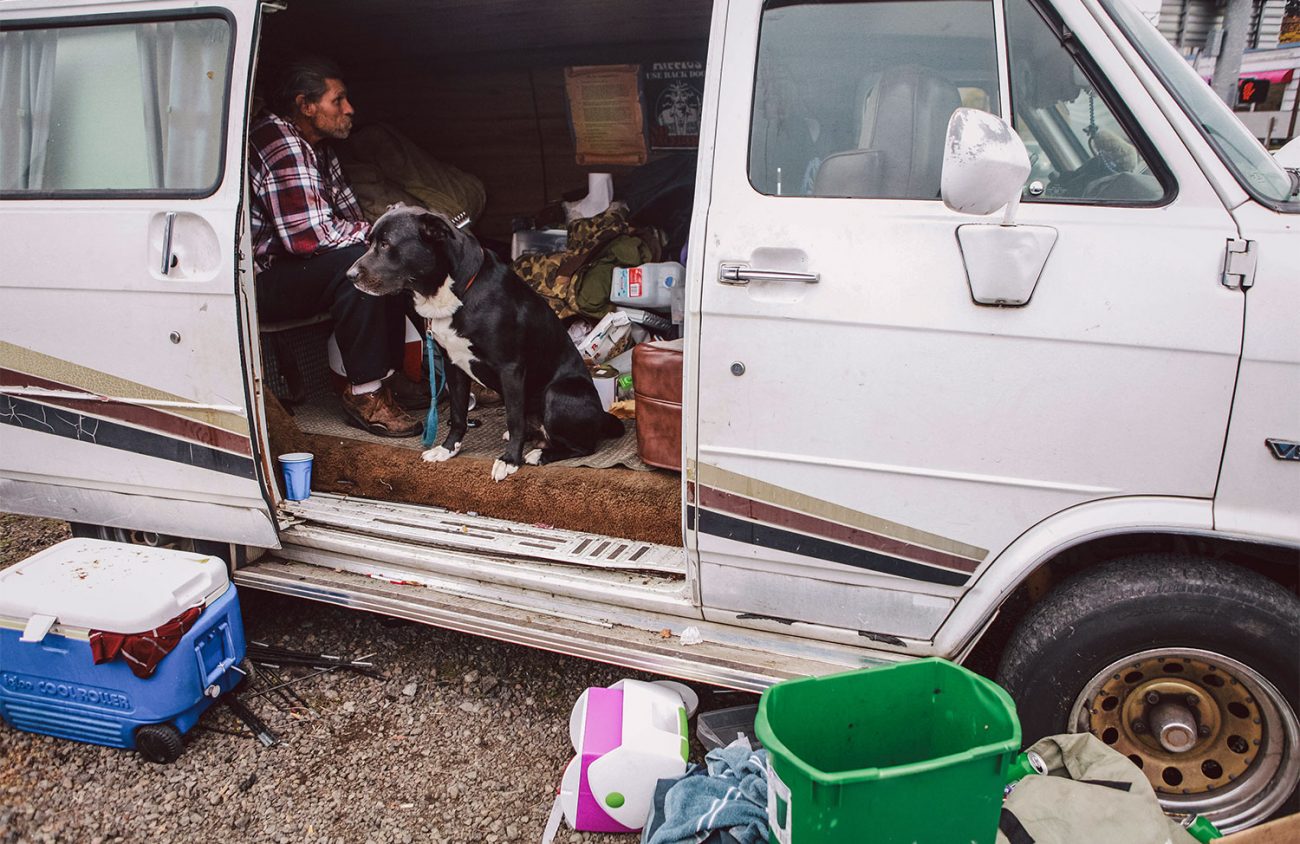They say a dog is a man’s best friend, but for those living on the streets unhoused, that companionship is even more important. For many unhoused people of any gender identity their pets are all they have.
But a proposed amendment to the Eugene City Code may threaten a houseless individual’s right to own their pets.
The suggested change would affect Section 4.330 of the code, which addresses animal neglect, by adding definitions for what qualifies as “adequate shelter” and “adequate bedding” for pets. The language of the definitions was copied from a measure passed by the Oregon State Legislature, but local homeless advocates are concerned that this could criminalize the unhoused individuals for not being able to provide shelter under their living conditions.
Notice for ordinance amendment was first posted on the city of Eugene website and in The Register-Guard on Jan. 3. A City Council public forum opened the floor for discussion on Jan. 19, but community member and advocate Zondie Zinke was the only one to speak on the issue.
“I spoke about this at the public hearing last week. It seems clear that the staff is not working for public benefit,” Zinke tells Eugene Weekly. She adds that although the language comes from state legislation and has been put into effect in other municipalities, it doesn’t mean Eugene has to.
In an email statement, Laura Hammond, the city’s community relations director, said the changes are implemented to make the city code consistent with “parallel statues that have been revised by the state Legislature.” The state legislation that defines adequate shelter for pets was amended in 2013 with Oregon House Bill 2783.
Hammond said based on the city’s research, the Oregon and U.S. humane societies, animal control officers and the Oregon Veterinary Medical Association were on board for the measure.
“Based on written and oral testimony on the bill, the definitions were added with regard to ‘minimum care’ to clarify and make it easier to understand. These definitions would also allow for greater consistency and fairness in the application of the law when enforcement is necessary,” Hammond said, adding later that the city appreciates hearing from community members about their concerns.
For Eugene, the previous version of the ordinance did not provide definitions to “adequate shelter” and “adequate bedding.” The following section in the code, 4.340, describes various degrees of animal neglect and lists inadequate shelter as a form of neglect. Previously, the law only specified that animals need to be protected from the elements.
With the added definitions of adequate shelter and adequate bedding, pets would not be allowed to live in crawl spaces or parts of buildings such as steps or stoops, a vehicle, shelters made by cardboard and other materials that are “easily degraded by the elements” and several other factors.
In regard to these specifications listed under animal neglect, Zinke says that unhoused people care for their animals just as much as any housed person does.
“There seems to be an even closer bond. The bond, when you are vulnerable and ostracized and all those things, you become tender to other possibilities of connection,” Zinke says.
She points out that this specific ordinance doesn’t mention unhoused individuals or even mention tents — the primary shelter for many — as an exception. With this language, Zinke says that police can more easily harass the unhoused and their dogs.
Ilyas Ansari has been unhoused for about a year, after he lost his job. During this time, he had his pitbull mix Chunk, who he says means everything to him. Ansari says he has faced harassment from other people about his dog in the past, but worries that the change to the city ordinance would be bad for all people.
“I don’t think people who make these rules sometimes understand what they are going to do,” Ansari says. He adds that in his experience being unhoused, having a dog around is comforting. “When things go bad, and you guys are both in the same conditions, dogs respond to the way you think they will.”
He explains that although he is saving up and will have enough money for housing soon, many people are not in the same situation, and though it may not be the intention of the city, this may be another way the homeless are criminalized.
Pro-Bone-O Veterinary Care — a local nonprofit that provides care of animals owned by those who are unhoused — also expressed opposition to the proposed amendments to the city code.
The organization sent a letter to the City Council, Mayor Lucy Vinis and City Manager Sarah Medary, writing that it is wrong to “target pet owners due to their housing circumstances” and that is unfair to assume a lack of a house means people will neglect their pets.
“Owners should not be expected to give up their beloved pet when they lose their housing and they should not be criminalized for keeping them if they are providing adequate care.” The letter also mentions that the city would have to increase staffing and funding in order to enforce the new regulations.
Zinke says this ordinance will probably be enforced selectively, resulting in the unhoused being more afraid on the streets.
“It’s just not okay that our city and the city staff are not considering the most vulnerable community with everything they do.”
The Eugene City Council will have the opportunity to discuss options when they take action on the ordinance. A date for this has not been specified.
